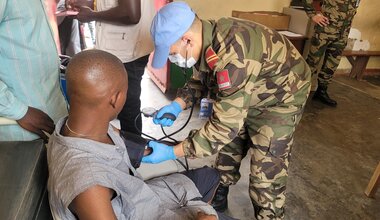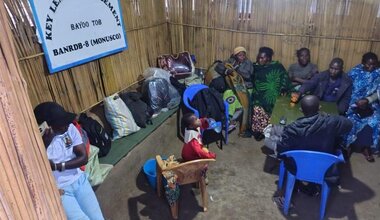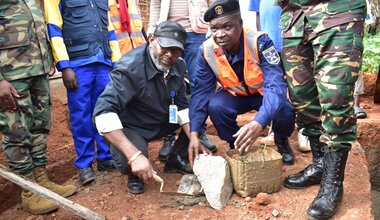Roger Meece: “A lot of work still remains to be done in Equateur province”
Mbandaka, 23 September 2010 – The Special Representative of the UN Secretary-General for the DRC during a working visit to the administrative town of Equateur province urged to ponder for a while and make an assessment of the achievements made by the DRC for the past ten years, while acknowledging that there was still a lot to be achieved to get the country in general and Equateur province in particular, out of the cycle of violence and for consolidation of peace.
The chief of MONUSCO amid a very busy schedule held meetings with the United Nations staff, local Civil Society, provincial Governor, local security committee and attended a symbolic launch of the second phase of vaccination campaign against poliomyelitis.
Mr. Roger Meece said that he came to listen to each and everyone in order to improve his understanding of the overall activities of the Mission in that western part of the country, even though, the huge challenges and problems confronting the province were evident.
About future of the MONUSCO Force, the Special Representative declared that pursuant to determination of the UN Security Council and the Congolese government, deployment of the peacekeepers will be done based on the situation on ground. A situation that has changed in the last 10 years, further acknowledged Roger Meece, adding that much progress has been made in DRC in favor of peace and security of the people.
However, Mr. Meece maintained that the Mission's priorities were still civilian protection, support to security sector reforms and to government efforts in the fight against sexual violence as well as to organization of the upcoming electoral process.
The SRSG also had lengthy talks with the provincial Coordination members of the Civil Society in Equateur province (SOCIEQ) who voiced concerns over Civil Society/Equateur's participation in the future Independent Electoral Commission (CENI) and in updating process of the voters' list and poor representation of women in decision-making institutions such as the Provincial assembly where there are only three women out of 108 provincial MPs and two out of ten ministers of the provincial government.
Other issues discussed included insecurity caused by elements of the Congolese National Police (PNC) and poachers as well as persistent sexual violence. The SRSG stressed for more efforts to create favorable conditions for development of the province as poverty is the root cause of many difficulties.
Mr. Meece also urged the Civil Society to further participate in public awareness activities focusing local population, especially women, in anticipation of the upcoming elections.
Before leaving Mbandaka, the Special Representative met the provincial Governor Jean-Claude Baende accompanied by provincial cabinet and provincial security committee members. During the courtesy call, they welcomed the collaboration between the provincial authorities and the United Nations and applauded the Special Representative's efforts to further enhance relations between UN and the Congolese authorities. Other issues: Exploitation of the Equatorial forest, rebellion by the "Mouvement de Libération des Indépendants et Alliés (MLIA)" and the upcoming elections were also discussed.
The Special Representative and the Governor of Equateur province also participated in the official launch of the second phase of a campaign against poliomyelitis in Equateur. Jean-Claude Baende and Roger Meece symbolically administered doses of polio vaccine to two children. The Special Representative returned to Kinshasa late afternoon.
 UN
UN United Nations Peacekeeping
United Nations Peacekeeping






